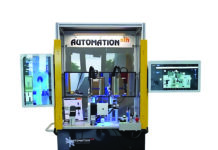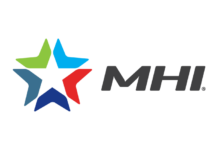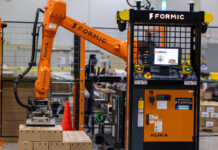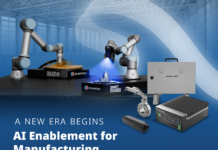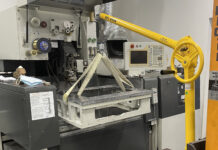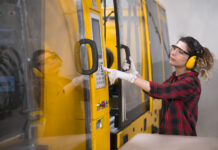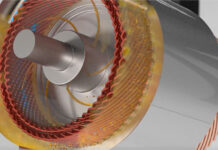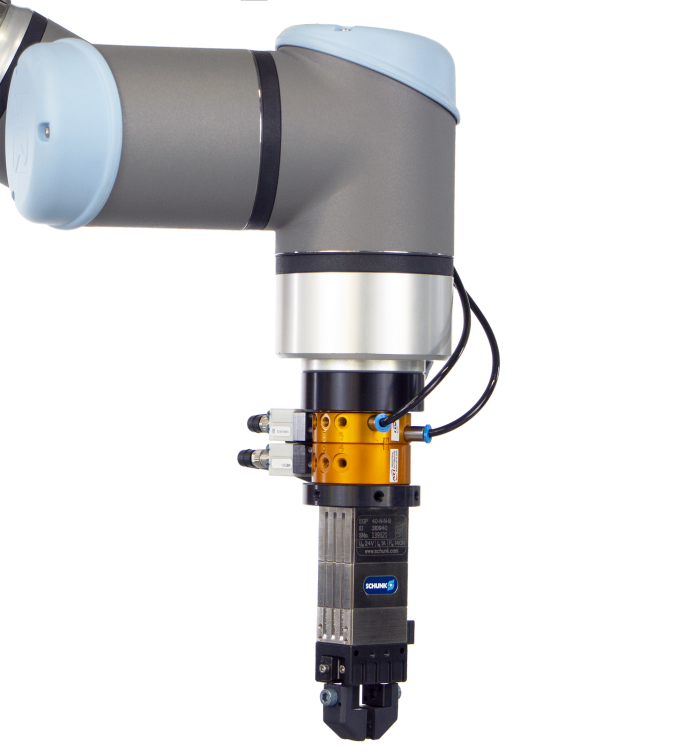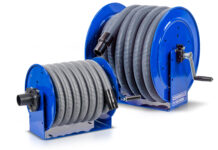Big things come in small packages, and ATI Industrial Automation’s QC-11 Automatic Tool Changer is no exception. The QC-11 is a vital component of many robotic applications and is now certified to work seamlessly with collaborative robots from Universal Robots, joining more than 150 products in the UR+ portfolio featuring plug-and-play solutions for UR cobots that help users get up and running quickly.
The QC-11 enables automatic exchange of robotic end-effectors without any manual intervention. With an ATI Automatic Tool Changer, a robot can utilize multiple end-effectors in a single process. Preceding the QC-11 in the UR+ program are ATI’s Axia80 Force/Torque Sensor and MC-10 Manual Tool Changer. ATI CEO Robert Little believes strongly in the power of partnerships: “Thanks to the exceptional UR+ certification program, ATI products can reach new users in the collaborative market,” he says. “It is a great opportunity for us as a business, but the real winners are our customers. Through Universal Robots’ stringent product qualification process, ATI products rise to a new standard of excellence. The collaboration between these two companies is genuinely more than the sum of its parts.”
The QC-11 is the first automated tool changer developed in the Americas to obtain UR+ certification and will be featured May 9 at ATI Industrial Automation’s Automation Expo held at the company’s recently expanded and renovated headquarters in Apex, North Carolina. The Expo is a unique opportunity for attendees to see this tool changer in action, witnessing its extremely high strength-to-weight ratio. When coupled, the Master and Tool weigh less than 0.25 kg (0.55 lbs), with a combined stack height of 52.4 mm (2.06 in). The small footprint of the robust QC-11 helps to optimize the robot payload and work envelope while supporting the maximum UR payload of 10 kg (22 lbs).
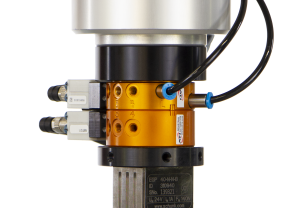 ATI’s patented, pneumatically-actuated, fail-safe, locking mechanism provides strong, repeatable coupling under the rigors of industrial use. It also ensures that the tooling remains securely attached to the robot—even during a loss of air pressure. The QC-11 features six integrated M5 pneumatic pass-through ports. It allows for an optional, accessory mounted, M8 connector for up to eight pass-thru electrical pin connections. Users can incorporate a compatible pin-and-bushing tool stand for storage of the additional end-of-arm tools as well.
ATI’s patented, pneumatically-actuated, fail-safe, locking mechanism provides strong, repeatable coupling under the rigors of industrial use. It also ensures that the tooling remains securely attached to the robot—even during a loss of air pressure. The QC-11 features six integrated M5 pneumatic pass-through ports. It allows for an optional, accessory mounted, M8 connector for up to eight pass-thru electrical pin connections. Users can incorporate a compatible pin-and-bushing tool stand for storage of the additional end-of-arm tools as well.
The UR+ program debuted in 2016 and has since grown rapidly to include 155 products from 400 companies active in the UR+ developer program.“Universal Robots is thrilled to welcome this continued expansion of UR+ certified products from ATI with the QC-11,” says Stuart Shepherd, Regional Sales Director for Universal Robots’ Americas division. “ATI’s commitment to product quality and customer experience is in perfect alignment with the vision of the UR+ program. We look forward to collaborating on future projects.”
About Universal Robots
Universal Robots was founded in 2005 to make robot technology accessible to all by developing small, user-friendly, reasonably priced, flexible, industrial robots that are safe to work with. Since the first collaborative robot (cobot) was launched in 2008, the company has experienced considerable growth with the user-friendly cobot now sold worldwide. The company, which is a part of Teradyne Inc., is headquartered in Odense, Denmark, and has subsidiaries and regional offices in the United States, Germany, France, Spain, Italy, Czech Republic, Poland, Turkey, China, India, Singapore, Japan, South Korea, Taiwan, and Mexico. In 2018, Universal Robots had a revenue of USD 234 million.
About ATI Industrial Automation
ATI is the world-leading, engineering-based developer of robotic accessories and robot arm tooling, including Automatic Tool Changers, Multi-Axis Force/Torque Sensing Systems, Utility Couplers, Robotic Deburring Tools, Robotic Collision Sensors, Manual Tool Changers, and Compliance Devices. The company’s robot end-effector products are found in thousands of successful applications around the world. Since 1989, ATI’s team of mechanical, electrical, and software engineers has been developing cost-effective, state-of-the-art end-effector products and solutions that improve robotic productivity.

